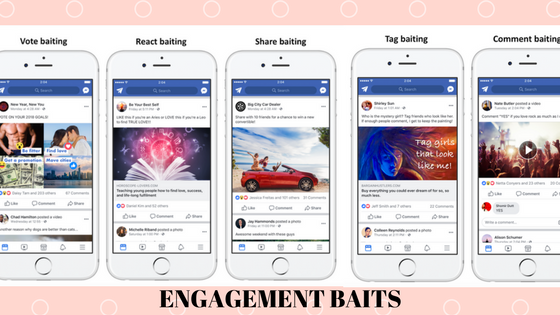The New Facebook Algorithm
- Blog, Digital Marketing, Social Media Management
- 07/04/18

The New Facebook Algorithm
The New Facebook Algorithm
Algorithms are constantly evolving in order to provide better experiences to both users and publishers.
When Facebook said that they would be changing the algorithm in order to favour content that creates “meaningful social interactions”, many businesses became worried that their organic reach would take a significant hit.
There are 4 main building blocks to Facebook’s algorithm:
1- Inventory: All of the content available in the NewsFeed
2- Signals: Data and considerations about the content
3- Predictions: The algorithm then analyzes these signals to predict whether or not your page’s fans care about the content
4- Overall Score: After Facebook makes these predictions, the algorithm calculates a score for relevancy and shows users the content from highest ranking score to Lowest ranking score.
Signals
Signals are what businesses should understand and focus on. Understanding what signals are and which signals to worry about will allow you to have your content rank higher in the NewsFeed.
There are thousands of signals in Facebook’s algorithm, but with this recent update, we have to remember that the algorithm will favour “meaningful social interactions”. This means that the algorithm will favour signals that promote active interactions such as comments, shares, reactions over passive interactions such as clicking, watching and viewing/hovering.
Facebook Algorithm prioritization: Comments>Shares>Reaction
They will also be prioritizing posts from friends and family over content from Facebook Pages. This totally makes sense if you’re trying to increase meaningful interactions. I completely agree that a person to person interaction is more meaningful than Person to Business/Page interaction. The engagement is much more authentic as well!
Comments:
You want as many authentic comments you can get. Conversations are really important now….so here’s a fact you should know:
Facebook live videos on average get 6 times as many interactions as regular videos.
Sharing:
Shares, both public and private, will help the ranking of your content. It’s also no longer good enough for your content to be shared without resulting in any discussion. You want your content to be shared and generate conversations.
Your content that gets shared will continue to be shown to other people’s newsfeed as long as people are interacting with it. If more people are interacting with it, the greater your reach will be. If the content gets shared but receives no comments/reactions, then your content will start to get demoted.
Reactions:
Although not something you should focus too much on, and definitely less important than shares and comments, reactions are considered a form of active engagement and will help your content rank higher.
Engagement Baits
You should also note that the practice of using “engagement baits” will decrease your ranking. So stay away from engagement baiting. So say goodbye to “tag a friend and say nothing” and reaction based voting.
Conclusion
Honestly, as a digital marketer, I am not worried about this change in the algorithm. If you have been riding the content marketing bandwagon and understand the art and science of content marketing, there isn’t too much for you to change. It might almost feel like this whole article was an introduction to content marketing… But the reality is that a lot of people struggle with content marketing and that’s why they’re worried.
This change in the algorithm simply forces businesses to put more emphasis on the quality of their content.
It means you have to create content for your audience rather than creating content for your brand. Doing so will increase the chances that your content will get shared and people will care enough to engage with it once shared.
Like what you see? Follow Us on LinkedIn !
Struggling to adapt to Facebook’s new algorithm? Talk to us!





Leave a comment